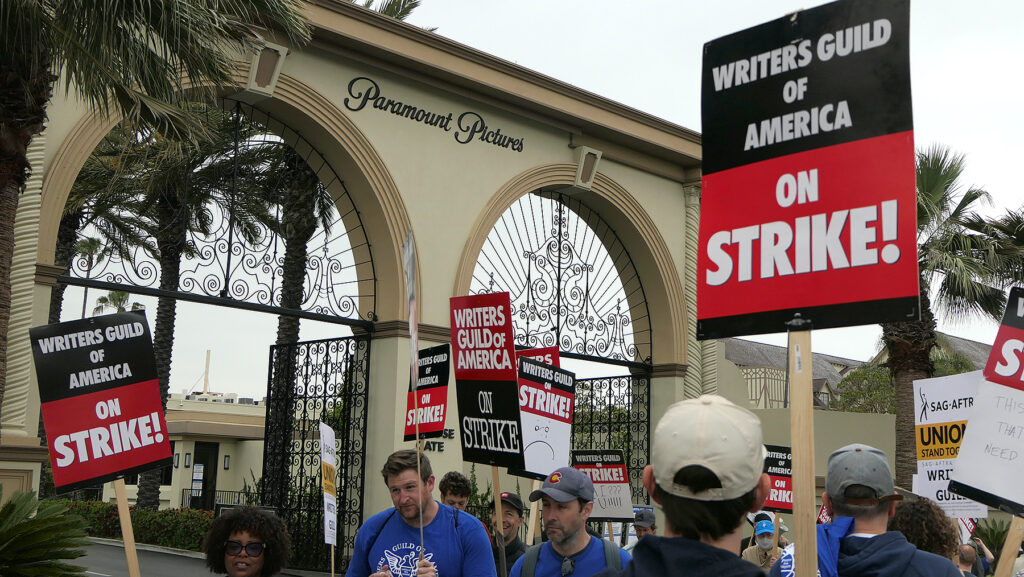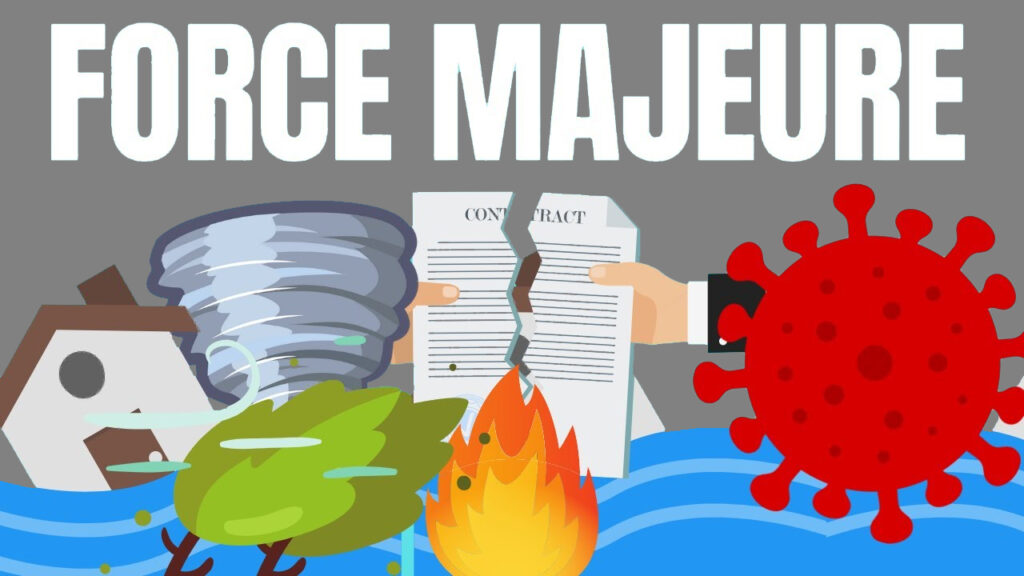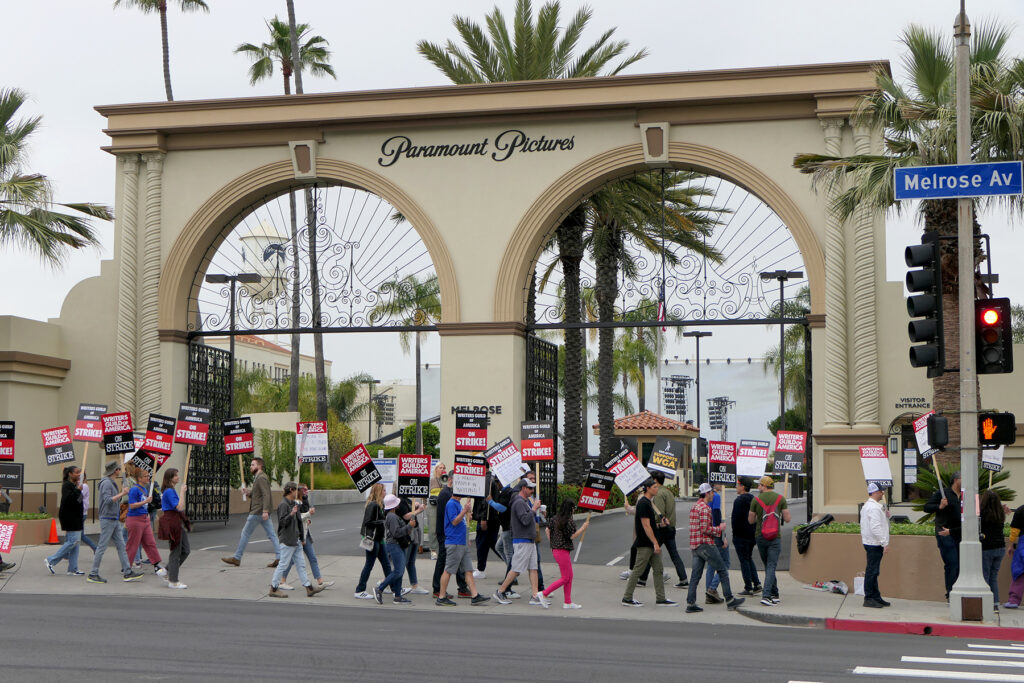Two things happened last week that could potentially affect the future of live-action Star Trek…and not in a good way. The first is that, at 12:01am on May 2, the Writers Guild of America (WGA) labor union, representing 11,500 writers, went on strike against the Alliance of Motion Picture and Television Producers (AMPTP). The last such strike happened in 2007-2008 and lasted 100 days.
Remember that number, because it’s important, and I will discuss it shortly.
The following morning, Paramount Global—which owns CBS, Nickelodeon, and the Paramount movie studio…and holds the rights to Star Trek—announced its earnings to shareholders for the first quarter of 2023. The news wasn’t good. By the close of the NASDAQ on that same Wednesday afternoon, Paramount share prices had dropped more than $6 (or upwards of 28%) from the previous day…which is a huge loss for investors and in market capitalization for the company.
Now, before anyone jumps up and starts blaming ALEX KURTZMAN for this, the bad earnings statement is not his fault. In fact, Paramount+ added 4.1 million new streaming subscribers during the first quarter, reaching a total of 60 million worldwide. While that’s certainly less than the 160 million subscribers internationally for Disney+, the latter has just experienced a slight drop in the most recent quarter while Paramount+‘s subscriber base has continued a steady growth. The issue for Paramount isn’t viewership. Instead, there’s what CEO BOB BAKISH called a perfect storm of “peak streaming investment intersect(ing) with fiscal ad softness.” In other words, there’s a scramble at the moment to load up on content for Paramount+ (spending a LOT of money to produce new streaming shows), while at the same time, advertisers aren’t exactly diving in yet to purchase ad time on the streaming service (less revenue).
There are also other systemic problems that Paramount had long before Alex Kurtzman ever got involved with Star Trek, and the movie studio along with CBS have both struggled financially for decades. Most recently, Paramount had only one major theatrical blockbuster hit in 2022 (Top Gun: Maverick) with $718 million gross ticket sales, three movies in the $100 million range, and the rest only in the the tens of millions. (See the full list here.) Granted, all of the Hollywood film studios are struggling at the moment as movie box office revenue is declining worldwide with the rise of streaming services—which is why so many studios like Paramount have been throwing money into launching new projects.
Indeed, that is the main reason that ViacomCBS (now Paramount Global) inked a jaw-dropping $160 million 5-year contract extension with Alex Kurtzman and his Secret Hideout production company. The idea was that Kurtzman would continue bringing out new Star Trek shows through at least 2026. Other streaming services like Disney+, Netflix, AmazonPrime, Apple+, and HBOMax were likewise spending like drunken sailors on content development, and announcements of new series and new seasons of returning series seemed to come almost weekly!
Then a harsh reality set in…
As global inflation increased and the U.S. Federal Reserve rapidly raised interest rates, the cost of borrowing money increased for everything from buying cars to houses to, well, financing television and movie production. As 2023 began, the studios that had been spending like drunken sailors suddenly began to wake up with hangovers and feelings of dread as they dejectedly looked at their bottom lines. Streaming services still needed to be loaded up with new content, but belts also needed to be tightened, and many projects that had already been announced were quietly (sometimes not-so-quietly) delayed or even canceled outright…projects like Star Wars: Rogue Squadron and most of the expected new movies from the DCU. And speaking of the DCU, many streaming series like Titans and Doom Patrol also got the axe, along with decisions to wrap up longer running expensive series like Stranger Things with final seasons.
So what does all of this have to do with the writers strike and Star Trek? Glad you asked!
Remember when I said 100 days was an important number to remember? That’s how long the previous writers strike lasted, and I suspect, that will be exactly how long this strike lasts, as well. How can I be so certain? It’s all in the fine print!
Nearly every Hollywood development contract includes a force majeure clause that essentially says that the contract becomes null and void if a situation develops, external to both parties and out of their control, that makes it impossible to honor the terms of the contract. Often, this means “acts of God” like major natural disasters and the such. But it can also include writers strikes. After all, the WGA is external to both the movie studios and the production companies and out of both of their controls. Neither entity can force the writers to call off their strike, and neither has a say in what the AMPTP negotiates…and on what time table.
Now, actually, that’s not entirely accurate. A number of studio executives are leaders of the AMPTP or at least have a great deal of influence on the organization—and they know exactly what would be best for their studios right now. And what might that be? Well, remember all of those deals like the one with Alex Kurtzman that were inked back when everyone was still a drunken sailor? For a studio like ViacomCBS (now Paramount Global) to cancel that deal would incur huge penalties and likely result in a costly breach of contract award in court that could well exceed the original $160 million.
Ah, but what about force majeure?
If a writers strike goes on for 100 days or more, nearly all contracts consider that a force majeure that nullifies the agreement. So if you’re Paramount, for example, and you want to get out of that $160 million commitment that you made to Kurtzman and Secret Hideout, a writers strike might seem very convenient!
Of course, it’s not just Paramount that has contracts it would rather wiggle out of. Costs are being cut at Sony Studios, Warner Brothers, Disney, Universal, Netflix, Amazon, Apple, and a host of others. And those guys also have a bit of a say on when negotiations will happen with the Writers Guild of America.
Now, keep in mind that delays in production hurt the studios’ bottom lines, as well, as they mainly make money when people watch their shows and movies. But three months (100 days) isn’t too much of a price to pay if it means eliminating expensive commitments that are eating into financial reserves just as studios like Paramount are beginning to struggle significantly with 28% share price drops.
So how could this affect Star Trek?
Well, in the short term, not at all. As this recent article from TrekMovie explains, STRANGE NEW WORLDS season two is complete and ready to hit the streaming platform next month. DISCOVERY‘s final season five is also in good shape and will drop in 2024. LOWER DECKS and PRODIGY have new seasons that are already written and in post-production, both scheduled to premiere later this year. Also animated series are much less expensive to produce and also have creators who are part of The Animation Guild (TAG), which is not striking. So whatever happens, expect the animated shows to continue.
Strange New Worlds‘ third season might see a slight delay if the strike goes on for longer than 100 days or members of other unions refuse to cross the picket lines. (This is currently happening with the fifth and final season of Stranger Things, as the Duffer Bothers have come out in support of the WGA and halted production until the strike is resolved.) But it’s doubtful that Strange New Worlds will be canceled since the studio has already sunk in significant capital building sets, making costumes and props, setting up production infrastructure and staff, etc. Paramount wants to get their money’s worth when they’ve already spent it, so expect at least a few more seasons of SNW.
After that, though, who can say?
If the strike goes on the full 00 days (and likely not too far beyond that, as the studios don’t want to lose any time they don’t need to), I fully expect to see some “adjustments” announced to plans for upcoming live-action Star Trek series and movies, and possibly a new contract—or lack thereof—with Secret Hideout. Please note: I am NOT predicting that Paramount will “fire” Alex Kurtzman. Those kinds of pronouncements reflect a naiveté and lack of understanding for how Hollywood works. For example, Alex Kurtzman is not an employee of Paramount—he is the founder of Secret Hideout—so they can’t “fire” him. Can they end his contract through force majeure? Possibly. But Paramount has already committed millions to Secret Hideout’s existing Star Trek series, which they want to keep making (and making money from), so they can’t simply cut all ties. In other words, the next time someone tells you Alex Kurtzman has been “fired” by CBS or Paramount, don’t believe them…just don’t.
On the other hand, Paramount could very well trim the multi-series deal down to just one new series or just one new movie or maybe one and one. Or perhaps they’ll delay any new Trek series for another year or two while Paramount looks for a buyer. After all, with SNW, LD, and Prodigy in production, their star franchise is still “healthy” and going strong…making Paramount seem attractive to potential buyers.
But will we ever see SECTION 31 and/or STARFLEET ACADEMY? Will we see STAR TREK: LEGACY? Or will plans for any or all of those series be delayed or scrapped entirely? And if another studio does buy Paramount (like Disney or Sony), will they respect the Star Trek that fans crave? Or will they try—like J.J. ABRAMS did in 2009—to turn Star Trek into something completely different? Right now, there’s no way to know. But the future of live-action Star Trek that seemed so certain just a month ago when new series were announced is no longer guaranteed.
In the meantime, let’s see if the writers strike ends in exactly 100 days like it did in 2007-2008. After all, I could be completely wrong. If the strike does end in 100 days, that should be sometime in mid-August.
By the way, interesting side-note: one of the people negotiating on behalf of the writers will be Writers Guild of America West President DAVID A. GOODMAN, who is a huge Trekkie and sci-fi fan. He was a writer and consulting producer on Star Trek: Enterprise, he wrote The Autobiography of James T. Kirk, and he’s currently a showrunner on The Orville. So yes, a sci-fi geek is leading this strike!
So don’t root against the writers in this one, folks. They’re not just striking for more money but also to avoid being paid less money. If you want to know more about what’s involved and what they’re asking for, this article is a must read and will make you more informed than 99% of the general public. It’s really worth the read!








The vast majority of force majeure clauses that I deal with have good faith exercise obligations- I think it’s enormously speculative to suggest that the writers’ strike could be used as a trigger for leveraged renegotiations.
I’d be fascinated to see the clauses that would allow for this! More basically, though, the question will be whether time is of the essence, and whether the length of the strike actually prevents either party from delivery, and to what extent. For multi-year deals, is a 100 day strike ever going to be a force majeure that renders the contract void?
One of the people involved in the discussions I had in preparing this blog had been the general counsel for a major talent agency here in Los Angeles during the previous writers strike, which lasted exactly 100 days, and he has reviewed many, many contracts during his career (obviously, he is not permitted to speak about the details of any specific one).
As for whether force majeure can be invoked in cases where a strike prevents production for a period of 100 days or more, as this article describes it, the answer is “complicated.” It’s neither a slam dunk for the studios nor the production companies, and it often leads to arbitration and confidential settlements rather than public, precedent-setting caselaw (a risk for both sides). But does and has force majeure historically been a factor in signed contracts later being altered and/or canceled entirely? Most definitely.
For contract lawyers, that last line is about like saying ‘has oxygen been involved in respiration!’ of course it’s going to be raised if you are trying to void a contract – but unless someone is going to go on the record and show the clause, I think it’s rank speculation.
Like me, Nadav, you are welcome to state any opinion you hold. I, of course, provided a link to the Variety article in support of my opinion. Since the contracts themselves are typically not made public, that is the best I can do. If that doesn’t meet your standards, well, life goes on. 🙂
When all is said and done, the equation here is very simple. Less than 100 days, and the development contracts remain locked. As soon as the 100-day point is hit, those contacts go from being carved in stone to malleable. For studios that really need to cut costs, malleable is a much better place to be. As such, we could very well see an adjustment to Paramount’s contract with Secret Hideout if the strike extends to 100 days or more. And if that happens, there might be (much) less money for new Star Trek series. Or not. We’re still very early in the game.
Jonathan,
it’s a wonderfully lawyerly article- which says precisely nothing about ANY prior precedent, claim or assertion- it’s says ‘this may be an issue but I can’t say that it ever HAS been an issue.’ In big firms, we often used to have someone responsible for trying to get articles like this placed- usually with a ‘if you want to learn more, make an appointment’ reference at the bottom.
I guess we will see…
Yep.